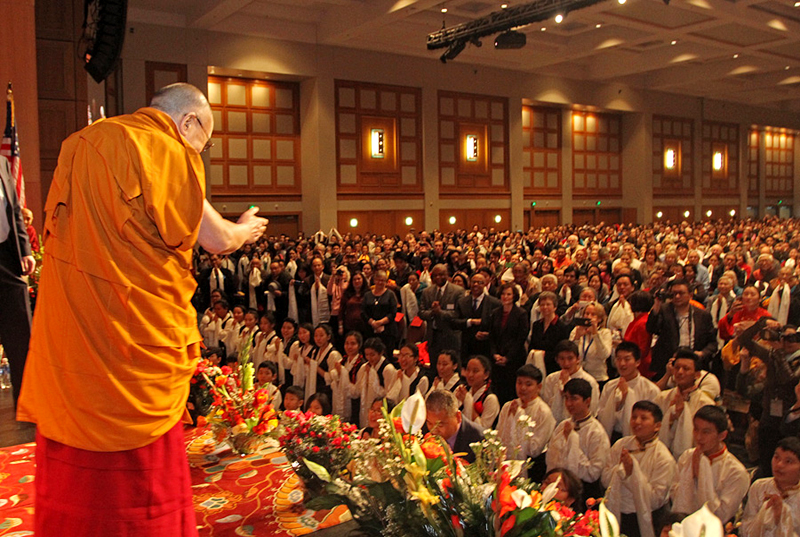 Minneapolis, Minnesota, USA — Addressing the 3000-strong crowd, mostly Tibetans, the spiritual leader of Tibet, His Holiness the Dalai Lama says that he "can never give up the cause of Tibet."
Minneapolis, Minnesota, USA — Addressing the 3000-strong crowd, mostly Tibetans, the spiritual leader of Tibet, His Holiness the Dalai Lama says that he "can never give up the cause of Tibet."
Arriving at the Convention Center in Minneapolis, Minnesota, USA on February 21, 2016, he was welcomed by hundreds of Tibetans and well-wishers, including representatives of the Tibetan community.
Mayor of Minneapolis, Betsy Hodges and State Representative Carolyn Laine also welcomed him to their city.
"I'm also a Tibetan," he said, "and since I've been nurtured by Tibetans since I was small, I can never give up the cause of Tibet," His Holiness said.
"In 2001 I semi-retired from political responsibility and in 2011 completely retired. I did this to promote democracy," the Nobel peace prize laureate said.
"Still, Tibetans both within Tibet and outside have placed their hopes in me, but now my responsibility is to work to protect Tibet's natural environment," he added, saying that, "which is fragile and delicate because of the altitude and dry climate."
"Because they see it as important to global climate change as the North and South Poles, some environmentalists have referred to the Tibetan Plateau as the Third Pole," Tibetan spiritual leader said, adding that "Special care needs to be taken of it."
Describing Tibetan culture as a culture of peace and non-violence, His Holiness suggested "it can contribute to making the world a more peaceful, compassionate place."
As for Tibet's Buddhist traditions, he said it seems to be the most complete transmission of the traditions of India's Nalanda University, including logic, psychology and a range of philosophical views.
The Tibetan Buddhist leader said that "these traditions are contained in the more than 300 volumes of Buddhist literature translated, mostly from Sanskrit, into Tibetan."
“Many Tibetans came here as refugees, although many of them have passed on. Now there is a new generation who were born and brought up here. I’ve met you now and then over the last ten years that I’ve been receiving care at the Mayo Clinic," His Holiness said, adding: "Two years ago we celebrated Losar together and I’m happy to see you all again."
“I’m glad to know that you are trying to preserve our traditional values. It's 57 years now that we’ve been in exile, while the turmoil in Tibet began 60 years ago. Nevertheless, you’ve kept your spirits up, which is praiseworthy, and maintained our cherished values, for which I’d like to thank you all," he said.
"The Tibetan spirit is strong and we’ve kept our culture and religious traditions alive, which is important because they have a contribution to make to the world at large. That’s something to be proud of," said His Holiness.
"The Nalanda tradition is based on logic and reason, which is why aspects of it appeal to scientists today. We Tibetans are able to study these traditions in our own language without any need to look elsewhere. It remains our responsibility to keep these traditions alive and to raise our children with love and affection," he added.
His Holiness has also assured fellow devotees that he is in fine health, despite receiving treatment at the Mayo Clinic in the United States. He urged Tibetans and supporters all over the world to be calm and happy. “I am in good health and nothing to worry. Probably the prayers got ‘answered’ as there is a special connection between students and the teacher,” he said.
During the course of his talk His Holiness also spoke about democracy promotion, human values, warmheartedness, inter-religious harmony and Buddhism.


![Tibet has a rich history as a sovereign nation until the 1950s when it was invaded by China. [Photo: File]](/images/stories/Pics-2024/March/Tibet-Nation-1940s.jpg#joomlaImage://local-images/stories/Pics-2024/March/Tibet-Nation-1940s.jpg?width=1489&height=878)















